Regional Action on Climate Change Initiative
2022-09-13Ain Shams University hosted the activities of the Regional Action Initiative on Climate Change “RACC” in cooperation with the International Drylands Development Commission (IDDC), the International Center for Agricultural Research in Dry Areas (ICARDA), and the Institute of Graduate Studies for Arid lands at Ain Shams University during the period from 3-5 September 2022 at Al-Mahlawi auditorium, Faculty of Medicine.
The events started with the presence of Prof. Dr. Mahmoud Sakr, President of the Academy of Scientific Research and Technology (ASRT), Prof. Dr. Ismail Serageldin, Honorary Secretary of the Library of Alexandria, Prof. Dr. Adel El-Beltagy, President of the International Committee for the Development of Dry Lands, and Emeritus Professor at the Agricultural Studies and Research Institute for Arid Regions (ALARI), Ain Shams University (chairman), Prof. Dr. Ghada Farouk, Acting Vice President for Community Service and Environmental Development Affairs, Mr. Ali Abu Sabaa, Regional Director of the Consultative Group on International Agricultural Research, Central Asia, West Asia and North Africa, as well as the Director General of the International Center for Agricultural Research in the Dry Areas (ICARDA), Prof. Dr. Osama Al-Behairi Professor of Horticulture and Dean of the Institute of Graduate Studies and Agricultural Research in Arid Regions, Prof. Dr. Sayed Khalifa, captain of agriculturalists, Prof. Dr. Ayman Farid Abu Hadid, former Minister of Agriculture and professor at the Institute of Agricultural Studies and Research for Arid Regions, a number of deans and vice-deans of colleges and faculty members, in addition to a group of prominent international and local personalities, and 75 graduate students from various African countries, six of whom - representing African regions - short presentations to reflect the impact of climate change in their areas.
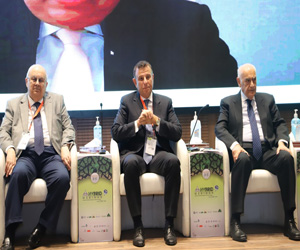 |
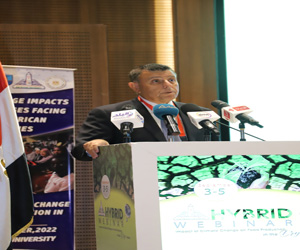 |
Prof. Dr. Mahmoud Mohieldin, Executive Director of the International Monetary Fund, participated via video conference.
Heat and nutritional deficiency
In his speech during the events, Prof. Dr. Mahmoud El-Metini, President of the University, welcomed the attendees from public figures and organizations supporting the conference and international organizations and stressed that the world is going through a difficult period resulting from the heavy consequences of the phenomenon of climate change, which will be reflected on the future of humanity.
He added that it is known that the rise in temperature will affect food production in the world and increase rates of undernutrition, which interferes with the health of citizens, and their ability to confront diseases and epidemics such as 19 Covid and others, noting that the dry areas in which two and a half billion citizens live, which include countries In Arabia, the rise in temperature will lead to the migration of citizens to other areas less affected, and this in turn leads to economic and political imbalance in the world. We participate in contributing to the vision of regionalization that is relevant to developing countries, especially in Africa and the dry regions.
Prof. Dr. Mahmoud El-Metini stressed that the bright side that humanity seeks depends on a political will to change the course with the availability of knowledge of the means and ways to confront climate changes and work on all elements of regionalization that depend on scientific research and innovation. Recent discoveries in biological sciences at the genetic level will contribute to the development of new varieties that withstand high temperatures and produce high-quality crops, and also the new in computer science and artificial intelligence (AI) will reflect on modern agricultural systems and smart agriculture.
He added that there is an agreement that the systems and patterns used in the universities of the world need to change in order to obtain the outcome of the interaction between the different disciplines in teaching and scientific research by forming multidisciplinary work teams to overcome the problems resulting from climate change and linking this in the academic curricula and scientific research, as well as with the agricultural sectors. And industry, civil society and cooperative institutions, and coordination with the Ministries of Environment and Planning.
Prof. Dr. El-Metini said that this meeting aims to develop a clear vision related to ways to confront climate change through regionalization, as well as seeking to increase the capabilities of countries located in the vicinity of the dry areas of the world to raise their capabilities in the positive and regionalization, as well as how to translate the promises since the Paris meeting and allocate $100 billion for regionalization into practical reality.
345 million people will be vulnerable to hunger
In his intervention via video conference, Prof. Dr. Mahmoud Mohieldin, Executive Director of the International Monetary Fund, thanked Prof. Dr. Mahmoud El-Metini, President of Ain Shams University, for hosting this important meeting, whose agenda is full of many important topics that are closely related to the priorities of climate action.
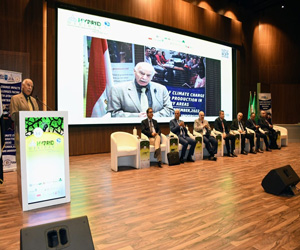 |
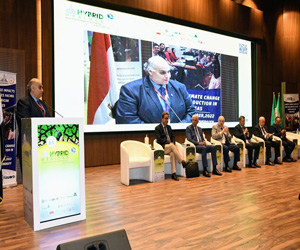 |
He stressed that man is responsible for the threat to food security that the world is witnessing, either by abusing the climate or by not taking appropriate measures to deal with problems until they turn into crises or through wars, pointing out that the Russian-Ukrainian war, according to a paper issued by the Secretary General of the United Nations, indicated that there are 345 million people who will be exposed to problems of food shortage and extreme hunger, and the war added 47 million people to those who suffer from food security problems, in addition to an increase of 71 million people who suffer from extreme poverty.
Prof. Dr. Mahmoud Mohieldin explained that there are five dimensions that are related to the areas discussed by the conference:
The first dimension is comprehensiveness. There must be interest in all dimensions. It is not just about focusing on reducing carbon emissions, despite it being an important priority. However, attention must be paid to issues such as poverty, food shortages and energy problems.
The second dimension is the implementation of pledges, as climate action has become filled with a large number of activities, but the important thing is the implementation of pledges and commitments, and to achieve this we need a database, scientific research and funding.
He added that the third dimension is the regional dimension, and in this regard, courses were held in Africa and Asia with the aim of making comprehensiveness and commitments the subject of implementation.
The fourth dimension is the localization of development, noting that in preparation for the climate conference, the Egyptian Cabinet, in cooperation with Climate Pioneers and under the auspices of the Egyptian Presidency, launched an initiative to select the most compatible projects with the Paris Agreement and the priorities of digital transformation through 27 Egyptian governorates, and 3 winning projects will be selected in 6 areas of presentation At the Climate Conference in Sharm El-Sheikh, he pointed out that the six areas are: (large-sized projects - small-sized projects - decent life projects - women-led projects - start-ups - projects with a developmental impact).
The last dimension he touched upon is financing, pointing out that the more reliance on investment to finance climate action, the better.
Emissions out of Africa
In his speech, Prof. Dr. Mahmoud Saqr, President of the Academy of Scientific Research and Technology, thanked Ain Shams University and the Institute of Graduate Studies and Research in Arid Lands for hosting this event at this time, explaining the outlines of the ministry's plan to confront climate change, highlighting the efforts in the previous period and the target during the period coming.
Prof. Dr. Sayed Khalifa, the head of the Agricultural Syndicate, praised the role of the Academy of Scientific Research, scientific institutions and Egyptian universities, and stressed that one of the most important issues and issues is the issue of food shortage, pointing out that the major countries, despite their huge financial resources, were unable to confront this crisis.
 |
 |
He pointed out that the conference is to enhance the capabilities of the Egyptian state to host the climate summit and to present the vision of civil society and the vision of the agricultural sector.
He added that the volume of emissions from the African continent is only 3%, unlike the major industrialized countries, which talk about granting loans to developing countries to confront the climate changes caused by these emissions.
He demanded that there be binding laws to support the issues of drought and food shortage in the developing countries of the major industrialized countries, as well as obligating them to finance projects to mitigate the impact in developing countries.
Support farmers
Prof. Dr. Serageldin, the founding director of the Bibliotheca Alexandrina, pointed to the role of climate action institutions, and that scientific and research institutions should encourage and support Africans to participate effectively in this work.
In her speech, Dr. Ismahan El-Wafi, Chief Scientist of the Food and Agriculture Organization (FAO), Rome, on the role of FAO in improving the livelihoods of local communities in drylands, stressing that small farmers are the ones who face and suffer from climate change and environmental crises, and they provide about 60% of food in Developing countries, for this reason, should be greatly supported by the settlement of environmental projects in all their forms.
Mr. Ali Abu Sabaa, Director General of the International Center for Agricultural Research in the Dry Areas (ICARDA) reviewed the role of the ICARDA Foundation as it seeks to save water and solve food shortages.
In his speech, Prof. Dr. Osama Al-Behairi, Dean of the Institute of Graduate Studies and Research for Agriculture in Arid Regions, said that the institute seeks to become a leading and recognized model for higher technological education at the local, regional and global levels, through the excellence of its educational and research outputs, community services and its role in development in the areas of striving to achieve a comprehensive economic and social renaissance. Based on knowledge of a dynamic agricultural sector capable of rapid sustainable growth and serving the purposes of scientific research, training and development locally, regionally and globally in arid regions.
The Institute of Graduate Studies and Research for Agriculture in Arid Regions - Ain Shams University undertakes to provide high-quality applied university education and learning opportunities through which it is possible to root and make knowledge available in scientific fields related to sustainable agricultural development in arid areas and to prepare human cadres in research, teaching and guidance to serve the development of communities in these areas It meets with contemporary global trends in the field of higher technological education, providing training and advisory services, scientific research services and exchanging experiences with the beneficiary sectors, in order to meet the needs of sustainable development in Egypt in general and the region served by Ain Shams University in particular, according to quality standards.
International Commission for Dry Areas Conference
On his part, Prof. Dr. Adel El-Beltagy, President of the Conference, said that the conference organized by the International Committee for Dry Zones under the chairmanship of His Excellency is held every two years in one of the countries of the arid region spread in Asia, Africa and South America.
The scientifically referenced case study will cover the following topics:
- Dynamic assessment (simulation modeling, ...) of the impact of climate change on ecosystems in different agro-ecological zones.
- Evaluation of genetic resources suitable for different agricultural environments resulting from climate change.
- Identify and update appropriate agricultural management techniques for different agricultural environments.
- Coping and Adaption Capacity
- Reviewing the political obstacles to implementing a strategy that would limit global warming to 1.5-2.0°C by 2050.
Defining approaches to mobilizing funds to help developing countries implement appropriate adaptation measures and enhance their resilience to climate change.
Extensive participation of scholars
The International Webinar on Climate Change (RACC), hosted by Ain Shams University, witnessed a wide participation of experts and scholars from inside and outside Egypt, where the number of attendees reached 420 scientists and researchers, while the number of attendees via video conference reached 517, and the number of views through communication sites The social network has more than 11 thousand views.
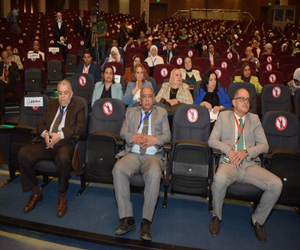 |
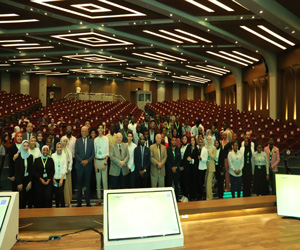 |
During the second day of the webinar, Prof. Dr. Ayman Farid Abu Hadid, Chairman of the Organizing Committee of the Conference, to clarify the important aspects of the impact of climate change at the local and regional levels and to identify strategies for adaptation to climate change, including the development of adaptive capacity and adaptive capacity through advanced science in genetic change, agricultural management techniques and means of enhancing resilience. On adaptation and adaptation in communities living in dry areas.
A participatory webinar was organized under the chairmanship of Mr. Ali Abu Sabaa, President of ICARDA, who gave the floor to Prof. Dr. Raj Baroda, President of the Fund for the Advancement of Agricultural Sciences (TAAS) India, the former Founding Chair of the Global Forum on Agricultural Research (GFAR) who gave a detailed presentation on the topic of resource adaptation. Genetic with climate change in drylands.
Mr. Ali Abu Sabaa, Director General of the International Center for Agricultural Research in the Dry Areas (ICARDA), explained the importance of the issues of adapting agricultural food systems in response to the global food crisis.
This was followed by a series of distinguished presentations and discussions, where Prof. Dr. Kawthar Abdullah Malik, HEC National Distinguished Professor in Biotechnology, the pioneering biotechnology program at Foreman Christian College, Lahore, Pakistan, spoke on the topic of climate change, its impact and mitigation techniques on agriculture and the environment.
Dry Land Crops
Prof. Dr. Sameh Hassanein, Head of the Department of Bioinformatics and Functional Genomics, Faculty of Biotechnology, Misr University for Science and Technology (MUST), Egypt, gave a presentation on gene editing for adapting dry land crops to climate change on behalf of Prof. Dr. Magdy Madkour Emeritus Professor of Biotechnology at Agricultural Research Institute in the Arid Regions (ALARI), Ain Shams University, Egypt.
On improving the livelihoods of smallholder farmers affected by climate change in Sinai, Egypt through optimal use of integrated saline farming systems, Prof. Dr. Hassan Mohamed El Shaer, Livestock Production and Pasture Exploitation, The Egyptian Center for Excellence in Saline Agriculture (ECESA), an adequate presentation.
Prof. Dr. Adel El-Beltagy gave the online floor to Prof. Dr. Raj Baroda, who spoke about the dynamic assessment (simulation modeling) of the impact of climate change on ecosystems in different agro-ecological zones.
He spoke about simulating the effects of climate change on crops and soil processes - Dr. Himanshu Pathak, Director General of the Indian Council of Agricultural Research (ICAR) and Secretary of the Department of Agricultural Research and Education (DARE), India.
Using satellites in food production
Then Dr. Farouk El-Baz, retired director of remote sensing, Boston University, USA, member of the Advisory Council of President El-Sisi from Egypt gave an interesting presentation on the importance of using satellite data and images to monitor and assist in food production in arid regions, and the importance of concerted international and scientific efforts between Different countries to overcome the phenomena of climate change and help each other to eliminate the phenomenon of global warming that threatens all of humanity.
On the subject of monitoring spatiotemporal urbanization and ecosystem responses in some areas of the central Nile Delta using remote sensing, Prof. Dr. Abdel Aziz Sheta, former head of the Soil Department, Faculty of Agriculture, Ain Shams University, Egypt, gave a distinguished presentation explaining these dimensions and their importance and importance. The use of those systems and tools to achieve the desired goals, and on modeling the hydrological responses to changes in land use, climate and land management in contrasting agro-ecological environments towards sustainable climate-smart land management.
From Ethiopia, A-D spoke. Atsushi Tsunekawa, Arid Land Research Center, ALRC / Tottori University, Japan.
Also, Prof. Dr. Toshichika Izumi, National Agricultural and Food Research Organization, Tsukuba, Japan, Visiting Professor, Agricultural Research Center, Tottori, Japan talked on the impact of rising temperatures and increasing demand posing a challenge to wheat supply in Sudan, Prof. Dr. Adel Abul-Naga, Emeritus Professor, Production Research Institute explained The Animal Agricultural Research Center and Prof. Dr. Mohsen Shoukry, Chairman of the Animal and Fisheries Research Council, Academy of Scientific Research and Technology, Egypt through their distinguished presentation on the national strategy and action plans to combat the impact of climate change on livestock.
Aquaculture
And about the study of the impact of climate changes on fisheries and aquaculture, he explained in the presentation, Prof. Dr. Mohamed Fouad Othman, Emeritus Professor, Department of Animal Production, Faculty of Agriculture, Ain Shams University, Cairo, Egypt, the impact of changing temperatures on aquatic organisms and the extinction of species due to change the environment in which they live, which poses an immediate danger to them.
Presented by Dr. Rania Gamal, ICARDA Researcher, Cairo, Egypt A distinguished study on the quantification and quantification of actual evapotranspiration using integrated satellite data for sustainable water management in dry areas.
Surface cultivation techniques
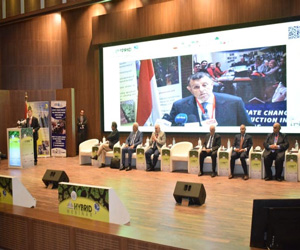 |
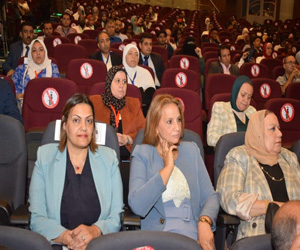 |
Prof. Dr. Osama El-Behairy, Dean of the Institute of Graduate Studies and Agricultural Research in Arid Zones, Ain Shams University, Egypt, spoke about the importance of surface cultivation techniques to combat global warming in Egypt, and the impact of the expansion of those techniques on the carbon dioxide equation in the atmosphere and the possibility of using them to reduce the degree of Heat, reducing heat emissions and reducing air pollution, which is directly reflected on the environment and human health, through a distinguished presentation in partnership with Prof. Dr. Ayman Farid Abu Hadid, Emeritus Professor at the Institute of Agricultural Studies and Research in Arid Regions (ALARI), Ain Shams University, Egypt .
Prof. Dr. Ratan Lal, Nobel laureate online, gave an interesting talk on the topic: Strengthening Resilience and Resilience (Human and Physical Infrastructure).
Then a discussion took place on the presentations on climate change and food security in times of multi-level crises through strengthening resilience, which was presented by Dr. Mouin Hamza “PhD in Science”, University of Montpellier - France, founder of the Dean of the Faculty of Agricultural Sciences, Lebanese University, Amin General of the National Council for Scientific Research - Lebanon (CNRS-L).
The topic (Changing Our Relationship to Nature) was discussed, which was presented by Prof. Dr. Dina Mariam, Global Peace Initiative for Women (GPIW), New York, USA.
On the importance of the need for a shift in awareness in dealing with climate change, Prof. Dr. Alia Rashed Rafea, Faculty of Girls, Ain Shams University, President and Founder of the Human Foundation, Egypt, spoke. Prof. Dr. Sharon J. Mijares, a psychologist, California Institute of the Humanities and National University, USA spoke about the issue of the decision to restore the environment is a human decision.
The biggest event for COP27 preparation
The international webinar "RACC Regional Action Initiative on Climate Change" continued for three consecutive days.
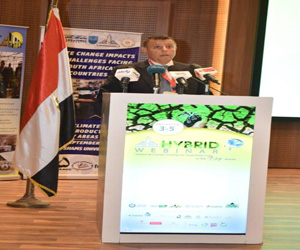 |
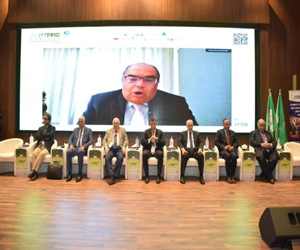 |
During the various lectures included in the conference, which amounted to 45 lectures, the impact of climate change on the different agro-environmental areas was discussed, and what this requires to conduct a dynamic assessment of the impact at the local and regional levels and the direct relationship of those impacts on the livelihood of the local population.
The conference presented the basic elements of adaptation, namely changing genetic resources that withstand high temperatures, as well as changing agricultural management patterns (irrigation, fertilization, etc.), and the practice of resource management that allows adaptation using the latest scientific outputs, including smart agriculture or modern digital agriculture, in addition to identifying ways and means to enhance Adaptation capabilities in dry areas.
This international webinar is the largest and most important event in preparation for the COP27 Conference of States Parties, which will be hosted by the Arab Republic of Egypt on the 7th of next November.


.svg)
